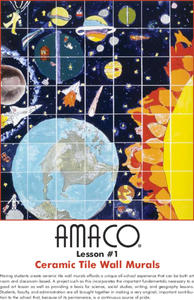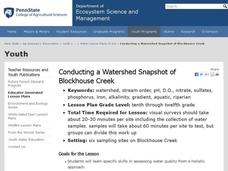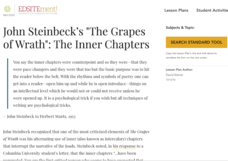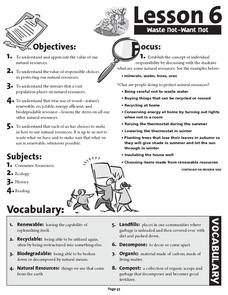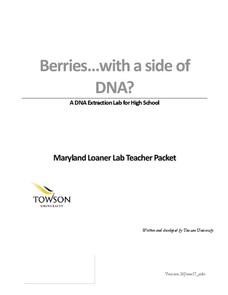American Art Clay Co., Inc.
Ceramic Tile Wall Murals
Science, social studies, language arts, and art classes work together with administrators to produce a permanent, ceramic tile wall mural to install at their school.
Ocean Explorer
Living with the Heat
Young oceanographers study the Submarine Ring of Fire, which is a series of deep-water volcanic vents that come up from the ocean floor. Learners take a close look at the unique ecosystems that are associated with these areas, how these...
Curated OER
Watershed Works: Unit 1
By constructing a watershed model and identifying watershed features in it, they discover how water erosion changes the landscape. As with most watershed modeling activities, this one is costly in terms of time and materials. It is,...
Curated OER
Pharaoh Mountain Hike: Investigating Adirondack Life Zones
Students hike a local mountain and examine its life zones. They measure various components at each zone and collect leaf litter at the sites. At the mountain top, students make descriptive observations and complete a handout about the...
Curated OER
"Conducting a Watershed Snapshot of Blockhouse Creek"
Students examine specific skills in assessing water quality from a holistic approach. They assess the health of a local watershed and identify problems in the local watershed and suggest remediation.
Curated OER
Finding, Gathering, Saving Seeds
Young scholars understand the importance of saving seeds. In this saving seeds lesson, students dry out seeds for later use planting. Young scholars recognize that one plant may have many seeds.
Curated OER
Hawaii's Sandy Shores
Investigate Hawaii's sandy shore ecosystem! Start by creating a vocabulary list and having your class complete a KWL chart. Next, pass out the "I think of" sheet. Each learner will then choose a word from a beach bucket and add it to...
Curated OER
National Marine Sanctuaries Fish
Information is provided on Gray's Reef, Florida Keys, and Flower Garden Banks marine sanctuaries. Young marine biologists then visit the FishBase and REEF databases to collect fish species information for each location. They then...
Curated OER
The Chesapeake Bay in Captain John Smith's Time
When Captain John Smith visited the Chesapeake Bay in the summer of 1608, what types of animals and habitats did he encounter? Your young historians will analyze primary source documents to answer this question, as well as compare the...
Alabama Learning Exchange
Make a Difference!
We are very dependent upon other life forms around us to survive. Here, scholars explore relationships in the ecosystem with the help of Auntie Litter and the pollution patrol. They imagine a world without grass, making connections to...
National Endowment for the Humanities
John Steinbeck’s "The Grapes of Wrath": The Inner Chapters
Here’s a must-have resource for anyone using The Grapes of Wrath. Everything from guiding questions to background information, from photographs to documentary films, from activities to assessments is included in a richly detailed packet...
Howard Hughes Medical Institute
Using DNA to Explore Lizard Phylogeny
In a fun and interactive two-day lesson, learners sort anole lizard pictures by appearance. Next, they watch a video about the anoles and re-sort based on the information in the video. In addition to physical characteristics, budding...
Captain Planet Foundation
Energy Flow in the Garden
How can you tell what an owl has eaten? Study the food chain and flow of energy in an ecosystem by dissecting an owl pellet and noting the bones found inside. Additionally, the lesson includes a game about consumers and producers with a...
Forest Foundation
Waste Not - Want Not
Recycling is the focus in the sixth of a nine-instructional activity series devoted to forest ecosystems. Class members read an article about the responsible use of natural resources and ways to reduce land fill.
Forest Foundation
Forest Health
Young foresters examine the strategies, like prescribed burns and thinning, that are employed to ensure healthy forests.
Forest Foundation
Forest Families
Class groups play a Forest Families card game to reinforce concepts presented in the first six sessions of a nine-lesson study of tress and forest ecosystems.
Cornell University
Center for Teaching Excellence (Syllabus Template)
Need a model for a college level course syllabus? Here's a good one. The editable template provided by this resource not only indicates key information that should be supplied, but also includes models for how various policies can be...
Global Oneness Project
The Value of Ancient Traditions
Imagine having to give up cell phones, computers, and TV? What would be lost? What gained? An examination of the Drokpa, a nomadic people who live in the grasslands of Tibet, provides class members an opportunity to consider how access...
Consortium for Ocean Science Exploration and Engagement (COSEE)
Arctic Smorgasbord
Though the walrus spends roughly one third of its time on land, it eats organisms that live on the bottom of the ocean. The first in a series of five, the lesson uses a variety of plant and animal cards to have scholars build an arctic...
Towson University
Berries...With a Side of DNA? (High School)
Is DNA still present after picking fruit or cooking vegetables? Biology scholars extract and collect DNA strands in an impactful lab. Working groups prepare their samples and compare their results to negative and positive standard...
Howard Hughes Medical Institute
Gorongosa: Making Observations Activity
Do you have young scientists wanting to make new discoveries rather than just completing the same experiments? Young scientists use their observational skills to identify animals and patterns in animal behavior. Through tracking...
Curated OER
Pen Pals
Students make their own predictions about the amount of different types of birds at each site before they go there. In groups, they collect the bird data and compose letters to their pen pals sharing their information. To end the lesson,...
Teach Engineering
Biomes and Population Dynamics - Balance Within Natural Systems
How large can a population become? The fifth installment of a nine-part unit teaches young ecologists about limiting factors that determine the carrying capacity of species in the Sonoran Desert. Here is a PowerPoint to help present this...
Pennsylvania State University
Learn, Protect, and Promote Water
A hands-on activity helps learners explore the water cycle. After discussing how they use water, classes discuss water pollution and then move into a simulation where 20 pupils move through the water cycle based on description cards.
Other popular searches
- Population Ecology
- Animal Ecology
- Human Ecology
- Behavioral Ecology
- Ecology Principles
- Community Ecology
- Pond Ecology
- Ecology Organizations
- Global Ecology
- Ecology Ethics
- Ecology Food Webs
- Ecology and Plants


